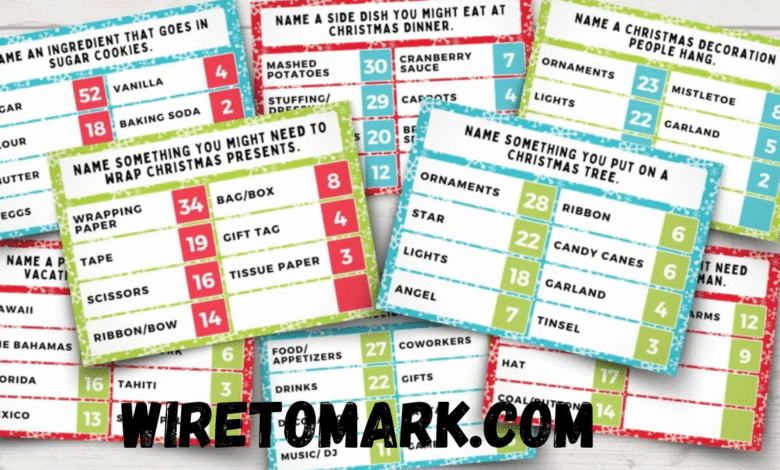Family Feud Questions A Fun Way to Spark Laughter

If you’ve ever tuned into the classic game show or tried a version at home, you know that family feud questions have a special way of bringing people together. They’re entertaining, often hilarious, and sometimes surprisingly thought-provoking. The best part is that they’re not only for game shows anymore. Families, friends, and even coworkers are now using them at parties, gatherings, and team-building events.
These questions aren’t just about testing knowledge; they’re about guessing what the “popular answer” might be. That twist makes the game exciting because it mixes humor with strategy. People laugh at the unusual guesses, cheer when they’re right, and sometimes get a little competitive. It’s a perfect mix for a memorable time.
Why Family Feud Questions Never Go Out of Style
One reason family feud questions remain so popular is because they’re simple. There’s no complicated setup, no need for special tools, and no steep learning curve. Anyone can jump in, from kids to grandparents. That inclusiveness makes it one of those timeless activities that continues to pop up at holiday dinners, office parties, and even classrooms.
Another reason they’ve stuck around is the unpredictability. You never quite know what the top answers will be. Someone might give a wild guess that seems wrong but turns out to be exactly what most people said. That unpredictability keeps people on their toes and makes every round feel fresh and new.
How Family Feud Questions Bring People Closer
At its core, family feud questions are about connection. They work best when everyone is laughing, sharing, and having fun. When you play, you’re not just competing—you’re bonding. People learn little things about how their loved ones think, and often the funniest moments happen when someone blurts out an unexpected response.
Games like this also remind us how important it is to spend quality time together. In a world filled with distractions, a few rounds of guessing silly answers can reset the mood and make everyone feel included. It’s not about winning or losing—it’s about creating shared memories.
The Secret Behind Great Game Show Questions
The brilliance of these questions lies in their design. They’re not trivia, which requires right or wrong answers. Instead, they’re based on surveys of what people commonly say. That means your job is not to be “correct” but to think like the majority. It’s a completely different type of challenge, and that’s what makes it accessible to all ages and knowledge levels.
This approach also keeps the energy flowing. Nobody feels left out because they didn’t know a fact about history or science. Instead, everyone gets to participate with their own unique perspective, which often leads to hilarious moments.
Turning Game Night Into Something Special
Adding family feud questions to your next game night can turn an ordinary evening into something extraordinary. It changes the atmosphere instantly. Instead of everyone scrolling on their phones, people are laughing, shouting out answers, and celebrating each other’s guesses.
It doesn’t take much to set up either. You can prepare your own list of questions, find them in books, or even use online resources. With just a little effort, you’ll have hours of entertainment that people will talk about long after the night is over.
Perfect for Parties and Gatherings
One of the best times to bring out family feud questions is at a party. Whether it’s a birthday, holiday gathering, or casual get-together, the game provides an instant icebreaker. People who may not know each other well suddenly have a reason to laugh and connect.
It’s also flexible enough to fit any crowd. For kids, you can use lighthearted topics like favorite ice cream flavors. For adults, you can add more creative or even slightly cheeky questions. The adaptability is what makes it perfect for any event.
How to Create Your Own Version

While there are plenty of ready-made lists of family feud questions, creating your own can be even more fun. Think about your group and what makes them laugh. Maybe it’s inside jokes, shared experiences, or favorite movies. Crafting questions around those themes makes the game even more personal.
You don’t need to overcomplicate it either. Just jot down a topic and think of likely answers. The beauty of the game is that it doesn’t require perfection—half the fun comes from unexpected responses.
Why It Works at Work Too
You don’t have to limit family feud questions to home gatherings. They’re excellent for team-building at work. They encourage communication, lighten the mood, and remind coworkers that it’s okay to have fun together.
Because the game is lighthearted, it breaks down barriers and helps teams bond. It’s much easier to collaborate after you’ve laughed with someone about their hilarious guess to a silly question.
Keeping It Fresh and Fun
To keep your rounds of family feud questions exciting, mix things up. Use a variety of topics—food, hobbies, pop culture, everyday life. The wider the range, the more surprising the answers will be. Variety ensures that everyone has a chance to shine.
You can also add little twists, like lightning rounds or themed nights. These small adjustments keep the game from ever feeling repetitive and make each session unique.
Benefits Beyond Entertainment
What many people don’t realize is that family feud questions provide more than just entertainment. They can sharpen quick thinking, encourage creativity, and even improve communication. Trying to guess what others think teaches you to consider different perspectives.
They also help reduce stress. Laughter is a natural mood booster, and this game offers plenty of it. After a long day or week, playing a round with family or friends can be the perfect way to unwind.
Tips for Hosting a Smooth Game
Hosting a game with family feud questions doesn’t require much, but a few tips can make it even smoother. First, prepare enough questions in advance so you don’t run out halfway through. Second, appoint someone as the host to keep things moving and handle disputes.
Also, remember that the goal is fun, not perfection. If someone makes a wild guess, celebrate it. The more laughter, the better the experience. A relaxed host sets the tone for everyone else to enjoy themselves.
The Lasting Impact of Shared Laughter
At the end of the day, what makes family feud questions so special is the joy they bring. When people play, they’re not just passing time—they’re creating memories that stick. Years later, you may not remember who won, but you’ll remember the moment when someone gave a ridiculous answer and everyone laughed until their sides hurt.
That’s the kind of connection that matters most. Games like this remind us why shared laughter is one of the strongest bonds we can have with others.
FAQs About Family Feud Questions
Q: Do I need a lot of people to play?
Not at all. While it’s often more fun with larger groups, you can play with as few as four people. Just adjust the number of rounds to fit your group size.
Q: Can I use family feud questions with kids?
Absolutely. Just make sure the questions are age-appropriate. Kids love guessing answers, and it’s a great way to keep them engaged during family gatherings.
Q: How many questions should I prepare for one game?
It depends on how long you want to play. For a short session, 10 to 15 questions might be enough. For a longer event, you might want double that to keep the energy up.
Q: Do I need special equipment to play?
Not really. All you need are the questions, a way to track points, and maybe a buzzer or bell if you want to add extra fun. Even without props, the game works just fine.
Q: What makes this game different from trivia?
Trivia tests knowledge, but family feud questions test how well you can think like others. That difference makes the game more inclusive and often much funnier.



